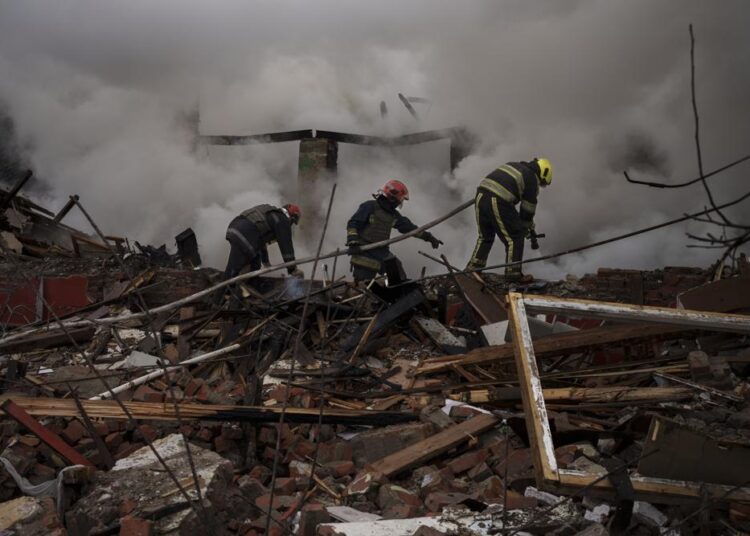KYIV, Ukraine — The presidents of four countries on Russia’s doorstep headed to Kyiv on Wednesday in a show of support for Ukraine, after Russian President Vladimir Putin vowed to continue his bloody seven-week offensive until its “full completion”, according to AP.
The presidents of Poland, Lithuania, Latvia and Estonia — all NATO countries that worry they may face Russian attack in the future if Ukraine falls — were due to meet the Ukrainian leader, Volodymyr Zelenskyy.
In one of the most crucial battles of the war, Russia said more than 1,000 Ukrainian troops surrendered in the besieged port of Mariupol. The information could not be verified, and it’s not clear how significant it would be, if true.
Russia attack on February 24 with the goal, according to Western officials, of taking Kyiv, toppling the government and installing a Moscow-friendly one. In the seven weeks since, the ground advance stalled and Russian forces lost potentially thousands of fighters — and the war has forced millions of Ukrainians to flee, rattled the world economy, threated global food supplies and shattered Europe’s post-Cold War balance.
US President Joe Biden on Tuesday called Russia’s actions in Ukraine “a genocide” for the first time, saying “Putin is just trying to wipe out the idea of even being a Ukrainian.”
Zelenskyy applauded Biden’s use of the word, saying “calling things by their names is essential to stand up to evil.”
“We are grateful for US assistance provided so far and we urgently need more heavy weapons to prevent further Russian atrocities,” he added in his tweet.
Lithuanian President Gitanas Nauseda said the leaders headed to Ukraine on Wednesday had “a strong message of political support and military assistance.”
Nauseda, Estonian President Alar Karis, Poland’s Andrzej Duda and Egils Levits of Latvia also plan to discuss investigations into alleged Russian war crimes, including the massacre of civilians.
Putin has denied his troops committed atrocities, and on Tuesday insisted Russia “had no other choice” but to attack and that the offensive aimed to protect people in parts of eastern Ukraine and to “ensure Russia’s own security.” He vowed it would “continue until its full completion and the fulfillment of the tasks that have been set.”
He insisted Russia’s campaign was going as planned despite a major withdrawal and significant losses.
Thwarted in their push towards the capital, Russian troops are now gearing up for a major offensive in the eastern Donbas region, where Russian-allied separatists and Ukrainian forces have been fighting since 2014, and where Russia has recognised the separatists’ claims of independence. Military strategists say Moscow believes local support, logistics and the terrain in the region favour its larger, better-armed military, potentially allowing Russia to finally turn the tide in its favour.
Britain’s defense ministry said on Wednesday that “an inability to cohere and coordinate military activity has hampered Russia’s attack to date.” Western officials say Russia recently appointed a new top general for the war, Alexander Dvornikov, to try to get a grip on its campaign.
A key piece to that campaign is Mariupol, which lies in the Donbas and which the Russians have besieged and pummeled since nearly the start of the war. Pockets of the city appeared to be still under Ukraine’s control — but it’s not clear how many forces are still defending it.
Russian Defense Ministry spokesman Maj.-Gen. Igor Konashenkov said 1,026 troops from the Ukrainian 36th Marine Brigade had surrendered in the city. It was unclear when the alleged surrenders occurred.
Ukrainian presidential adviser Oleksiy Arestovych did not comment on the allegation, but said in a post on Twitter that elements of the same brigade managed to link up with other Ukrainian forces in the city as a result of a “risky maneuver.”″
Zelenskyy adviser Mykhailo Podoliak said on Twitter that the city’s defenders were short of supplies but were “fighting under the bombs for each metre of the city. They make (Russia) pay an exorbitant price.”
Ukrainian forces in Mariupol have alleged that a drone dropped a poisonous substance on the city. The assertion by the Azov Regiment, a far-right group now part of the Ukrainian military, could not be independently verified. The regiment indicated there were no serious injuries.
Ukrainian Deputy Defense Minister Hanna Maliar said on Tuesday officials were investigating, and it was possible phosphorus munitions — which cause horrendous burns but are not classed as chemical weapons — had been used in Mariupol, which has been pummeled by weeks of Russian assaults.
Deliberately firing phosphorus munitions into an enclosed space to expose people to fumes could breach the Chemical Weapons Convention, said Marc-Michael Blum, a former laboratory head at the Netherlands-based Organization for the Prohibition of Chemical Weapons.
Western officials warned that any use of chemical weapons by Russia would be a serious escalation of the already devastating war. Zelenskyy said that while experts try to determine what the substance might be, “The world must react now.”
In Washington, a senior US defense official said the Biden administration was preparing another package of military aid for Ukraine to be announced in the coming days, possibly totalling $750 million. The official spoke on condition of anonymity to discuss plans not yet publicly announced.
Biden used the word “genocide” about Russia’s actions during a visit to Iowa. He said it would be up to lawyers to decide if Russia’s conduct met the international standard for genocide, but said “it sure seems that way to me.”
Neither he nor his administration announced new consequences for Russia or assistance to Ukraine following the assessment.






Discussion about this post